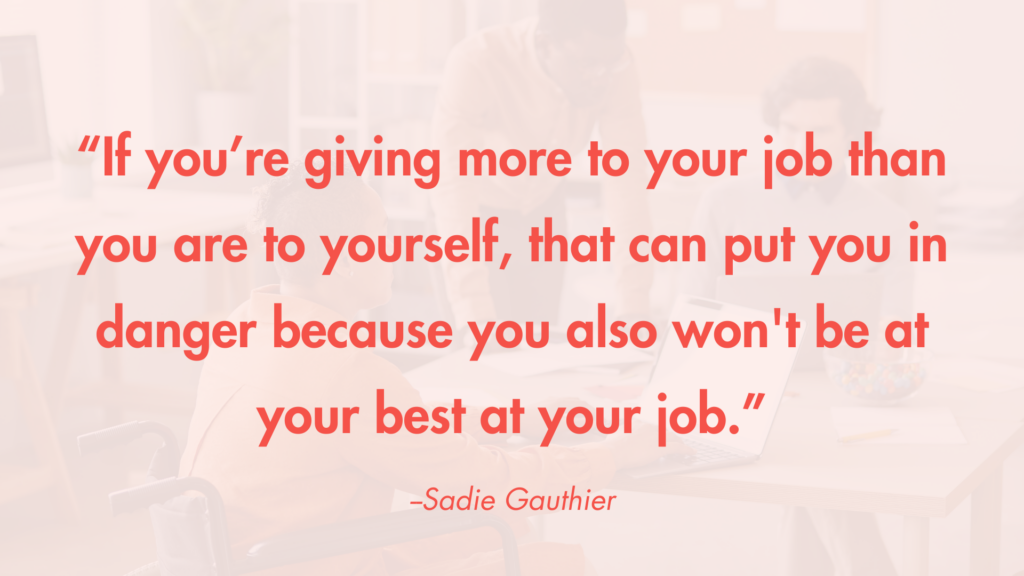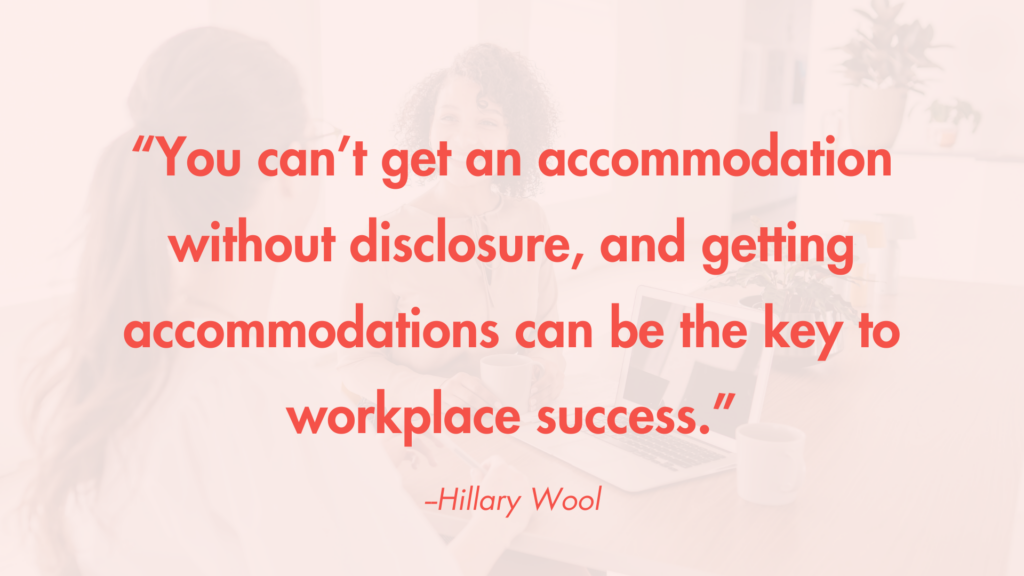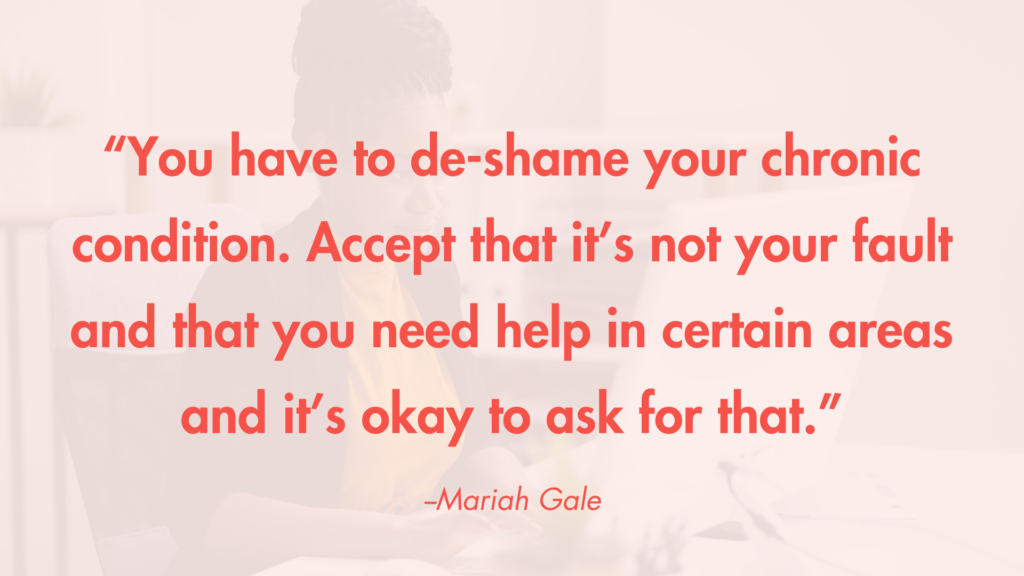Navigating Chronic Illness in the Workplace: Experts Weigh In
June 6, 2024
Features insights from Hillary Wool, Partner at Boston Consulting Group, Mariah Gale, CEO of Level Up Collaborative, Emily Levy, Co-Founder & President of MightyWell, and Sadie Gauthier, SROC Engineer at SANS Institute
For women living with chronic illnesses like autoimmune and mental health conditions, navigating work-life presents a unique set of challenges and experiences
How can you balance your work life with your health? How should you handle disclosing your condition in the workplace? How can you access the accommodations you need?
Our expert panel of powerhouse Chronic Bosses – ambitious women living with chronic conditions – share their insight, both from the perspective of traditional work environments and entrepreneurship, so you can confidently pursue your career dreams and get the support you need in the workplace.
Related Article: 5 Steps Before You Start a Business with a Chronic Condition
Balancing Career and Health

For highly ambitious women who are dedicated to their careers, one of the challenges can be trying to give 100% to health and work at the same time.
According to Sadie Gauthier, SROC Engineer at SANS Institute, “If you’re lucky enough that your job is your passion, it’s sometimes hard to pull yourself away and do what’s best for you, so re-evaluating that from time to time is really important. If you’re giving more to your job than you are to yourself, that can put you in danger because you also won’t be at your best at your job.”
Emily Levy, Co-Founder and President of MightyWell, says “The biggest thing I had to learn the hard way was not to burn myself out and set energy boundaries.”
Her advice is to set ‘energetic boundaries’ by keeping track of your daily energy budget based on what you have to do each day and fun activities you enjoy, so you can plan your days in a way that avoids expending all of your energy. So, she says, if you have a big event in the evening, perhaps you plan a shorter workday to save some energy for that event.
Emily also advises that it’s important to learn to say no. “Sometimes it’s not a flat-out no,” she says, but instead she’ll offer an alternative.
“So, if someone wants to pick my brain on a Zoom meeting, but I don’t have the time or energy budget, I’ll ask them to send me written questions I can answer instead.”
Additionally, women with chronic health conditions tend to be underrepresented in the workplace due to health needs requiring them to take a break from work. Hillary Wool, Principal at Boston Consulting Group, shares the encouragement that “it’s okay to have ebbs and flows in your career.”
Hillary’s approach has been “going slow to go fast,” taking breaks or working at a reduced capacity, in order to get ahead in her career. “It’s been a winding and at times slower path, and there’s no shame in it,” she says.
Read More: Leveraging Your Voice on LinkedIn
Disclosure in the Workplace

For many women with chronic conditions, disclosure in the workplace is a challenge – navigating who to tell, when to tell them, and how to have the conversation. Disclosure is important because it’s required for employers to provide appropriate workplace accommodations.
Hillary recognizes that there are risks involved in disclosing, especially the mental burden for people living with multiple identities. Additionally, those with a physical disability may not have the choice to disclose because their disability is visible when they enter the room. “You can’t get an accommodation without disclosure, and getting accommodations can be the key to workplace success,” says Hillary.
Sadie echoes Hillary’s sentiment that there are risks involved and disclosure is different for everyone. She recommends using easy-to-understand language rather than chronic illness jargon, and keeping the conversation focused on what support you need to work at your best.
For Mariah Gale, CEO of Studio Reverie and Mariah Gale Creative, disclosure is about “creating points of connection with people, and creating opportunities for people to see how diverse an identity can be for a person who is successful.” Mariah has ADHD, and she shares that early in her career, she would avoid using the term but rather, say that her “brain works differently.” Now, she uses the term because she wants to raise awareness and encourage others to embrace their identities.
Disclosure is also relevant to those in a managerial role, which Emily explains as “disclosing down.” She explains that those managing a team can have an open conversation with them about how they can work together and have a successful collaboration.
Related Article: 7 Tips for More Effective Networking with a Chronic Condition
Accessing Workplace Accommodations

Following the disclosure of a chronic health condition, accessing accommodations is the next step. Hillary’s suggestion is to frame the request for accommodations in terms of what will enable you to do your best work. She also recommends finding mentors who share your identities and can make it more likely that you will be successful in a role.
For those who may feel nervous about asking for accommodations, Mariah provides the encouragement that “you have to de-shame your chronic condition. Accept that it’s not your fault and that you need help in certain areas and it’s okay to ask for that.” In fact, providing reasonable accommodations to qualified employees with physical or mental limitations is required.
Sadie shares that “As much as it can be an uncomfortable conversation to have, there are really low-cost options for a lot of accommodations that you can present to your company.” However, as Sadie notes, “Sometimes you have to know when to quit when the system isn’t set up for you.”
The Chronic Boss Collective is a first-of-its-kind membership community for high-powered career women with chronic conditions to dream big and maintain their health – no trade-offs. Learn more about membership.
